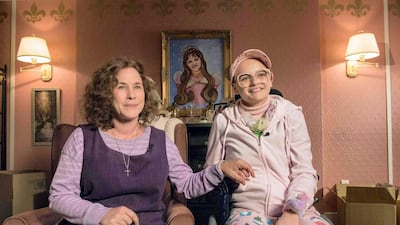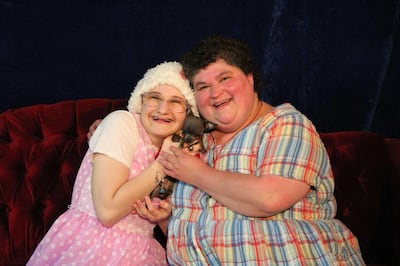In June 2015, Dee Dee Blanchard was found face down on her bed in her Missouri, US home in a pool of blood, dead from stab wounds inflicted several days earlier.
Her adult daughter Gypsy Rose, who suffered from leukaemia and muscular dystrophy and had a mental age of seven, was nowhere to be found and her wheelchair was still at home.
The next day, Gypsy Rose was located in Wisconsin with her boyfriend Nicholas Godejohn.
Public shock at the abduction of a severely handicapped girl gave way to bewilderment as it became clear that Gypsy Rose did not have leukaemia, did not need a wheelchair and was a fully developed adult.
Gypsy Rose had been a victim of her mother's Munchausen syndrome by proxy – a mental condition where a caregiver induces illness in someone in their care as a means of gaining sympathy or attention.
Dee Dee had successfully convinced her daughter, family and friends, and a host of medical professionals and charities who gave support to the pair that Gypsy Rose was severely disabled.
But her daughter gradually discovered that she was not the medical emergency she had long been led to believe, and she and Godejohn, who she met online, eventually plotted to murder her mother and break free.
Streamer Starzplay has now adapted the incredible story into The Act, an eight-part drama starring Patricia Arquette and Joey King as the mother and daughter.
Arquette, who was unaware of the story before landing the role, admits the situation came as something of a revelation.
“I found this story really shocking, that a parent would ever harm their child. The reality of medical abuse like this is so shocking and disturbing to me, but I felt like it was a really important story to tell,” she says.
“I’ve done a little research on it and it’s a part of mental illness that’s vastly understudied.
"It’s really a tragic story, the story of all three of these people and their complicated relationships with one another, especially the confusing relationship between Gypsy and Dee Dee, which has elements of love and then this brutal abuse.”
Arquette says her children had heard the story and they were not keen on their mother taking the role.
"My kids had heard about this story and when I told them I was thinking of doing this, they were like, 'Please don't. Don't play that lady'," she reveals.
"It's so scary, this idea that a mum would ever do that. I told them, 'I'm just acting'."
Arquette admits that she found it hard to get into her role, given the enormity of the mother's transgressions.
“It was kind of just getting past my own judgment of Dee Dee, I guess. To get to the place where I felt that as an actor I would need to,” she says.
“I think everybody does things subconsciously in life. They’re certainly not doing the kind of things that Dee Dee is doing, but I think Dee Dee is very much a creature of subconscious behaviour.
"She really doesn’t understand, I don’t think, why she’s doing what she’s doing at all. One thing I would add is that I think she’s also a real narcissist, who thinks she’s smarter than everyone else.”
Arquette is probably best known as a film actress, following leading roles in critically acclaimed movies such as the cult classic True Romance, David Lynch's Lost Highway and Richard Linklater's epic Boyhood.
But recently she has become a regular fixture on the small screen, with key appearances in the CSI franchise, HBO's Boardwalk Empire and most recently, the Showtime mini-series Escape at Dannemora.
The actress says the traditional line between TV and film is becoming increasingly blurred with HBO and Netflix.
“When I started doing TV, I came from the movie world and a lot of people said to me, ‘You’re going to destroy your movie career because you’re doing TV',” Arquette says.
“It was like a ‘lesser’ form of art or something like that. But my great-grandparents had been in vaudeville and I liked this idea of being on network TV and being able to be close to people who were at home and didn’t have a lot of money.
"I really wanted to push back on that idea that you had to wait and only do films. I felt that was sort of snotty in some kind of way.”
Although Arquette concedes that, historically, TV may have been the poor cousin to film, she's certain that those days are well behind us.
“I saw that there were all these networks showing up – you could have 500 channels but they were all playing the same things, and I kept waiting for the day," she says.
"I said to myself, ‘These places are going to have to start developing new content and that will be really great when that happens because there will be a lot of work for a lot of actors'.
“It took a long time for it to catch up with itself. Now we’re in that age of new content. And because of that need for new content, I think it is opening a lot of doors to projects that probably would have never been made.”
Returning to her latest role, in The Act, Arquette returns to the true crime genre for her second successive time on screen, after last year's Escape at Dannemora. She says there is something inevitably fascinating about the genre that transcends human history.
"I think that crime stories, or these kinds of tragedies – you know the Greeks were writing about them. They're in the Bible. I don't think it's something new, being fascinated by intense human behaviour, even murder," she says.
"It's always been a part of our shared mythology. I read stories about Dee Dee or even Tilly [Mitchell, from Escape at Dannemora]. I mean, if I wrote that, nobody would believe it.
"But the fact that someone really lived through this and made the choices they made and did the things they did. It’s utterly fascinating.”
The Act is streaming now on Starzplay.


